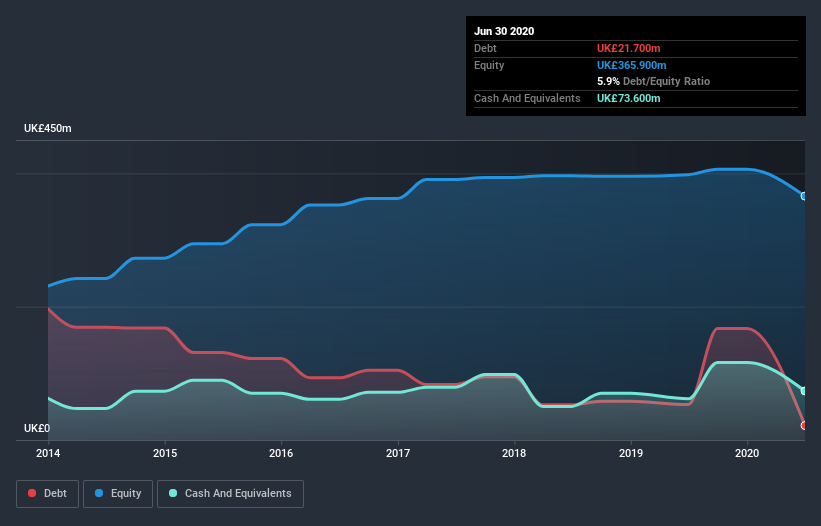Does Rank Group (LON:RNK) Have A Healthy Balance Sheet?

Warren Buffett famously said, 'Volatility is far from synonymous with risk.' When we think about how risky a company is, we always like to look at its use of debt, since debt overload can lead to ruin. We can see that The Rank Group Plc (LON:RNK) does use debt in its business. But the real question is whether this debt is making the company risky.
Why Does Debt Bring Risk?
Debt assists a business until the business has trouble paying it off, either with new capital or with free cash flow. If things get really bad, the lenders can take control of the business. However, a more common (but still painful) scenario is that it has to raise new equity capital at a low price, thus permanently diluting shareholders. By replacing dilution, though, debt can be an extremely good tool for businesses that need capital to invest in growth at high rates of return. When we examine debt levels, we first consider both cash and debt levels, together.
Check out our latest analysis for Rank Group
What Is Rank Group's Debt?
You can click the graphic below for the historical numbers, but it shows that Rank Group had UK£21.7m of debt in June 2020, down from UK£53.1m, one year before. But it also has UK£73.6m in cash to offset that, meaning it has UK£51.9m net cash.
How Strong Is Rank Group's Balance Sheet?
According to the last reported balance sheet, Rank Group had liabilities of UK£220.7m due within 12 months, and liabilities of UK£340.5m due beyond 12 months. Offsetting this, it had UK£73.6m in cash and UK£32.9m in receivables that were due within 12 months. So its liabilities total UK£454.7m more than the combination of its cash and short-term receivables.
Given this deficit is actually higher than the company's market capitalization of UK£337.2m, we think shareholders really should watch Rank Group's debt levels, like a parent watching their child ride a bike for the first time. In the scenario where the company had to clean up its balance sheet quickly, it seems likely shareholders would suffer extensive dilution. Given that Rank Group has more cash than debt, we're pretty confident it can handle its debt, despite the fact that it has a lot of liabilities in total.
Shareholders should be aware that Rank Group's EBIT was down 43% last year. If that earnings trend continues then paying off its debt will be about as easy as herding cats on to a roller coaster. The balance sheet is clearly the area to focus on when you are analysing debt. But ultimately the future profitability of the business will decide if Rank Group can strengthen its balance sheet over time. So if you want to see what the professionals think, you might find this free report on analyst profit forecasts to be interesting.
Finally, while the tax-man may adore accounting profits, lenders only accept cold hard cash. While Rank Group has net cash on its balance sheet, it's still worth taking a look at its ability to convert earnings before interest and tax (EBIT) to free cash flow, to help us understand how quickly it is building (or eroding) that cash balance. Over the last three years, Rank Group actually produced more free cash flow than EBIT. That sort of strong cash generation warms our hearts like a puppy in a bumblebee suit.
Summing up
Although Rank Group's balance sheet isn't particularly strong, due to the total liabilities, it is clearly positive to see that it has net cash of UK£51.9m. And it impressed us with free cash flow of UK£92m, being 108% of its EBIT. Despite its cash we think that Rank Group seems to struggle to grow its EBIT, so we are wary of the stock. There's no doubt that we learn most about debt from the balance sheet. But ultimately, every company can contain risks that exist outside of the balance sheet. For instance, we've identified 3 warning signs for Rank Group that you should be aware of.
If you're interested in investing in businesses that can grow profits without the burden of debt, then check out this free list of growing businesses that have net cash on the balance sheet.
This article by Simply Wall St is general in nature. It does not constitute a recommendation to buy or sell any stock, and does not take account of your objectives, or your financial situation. We aim to bring you long-term focused analysis driven by fundamental data. Note that our analysis may not factor in the latest price-sensitive company announcements or qualitative material. Simply Wall St has no position in any stocks mentioned.
Have feedback on this article? Concerned about the content? Get in touch with us directly. Alternatively, email editorial-team@simplywallst.com.

 Yahoo Finance
Yahoo Finance 
